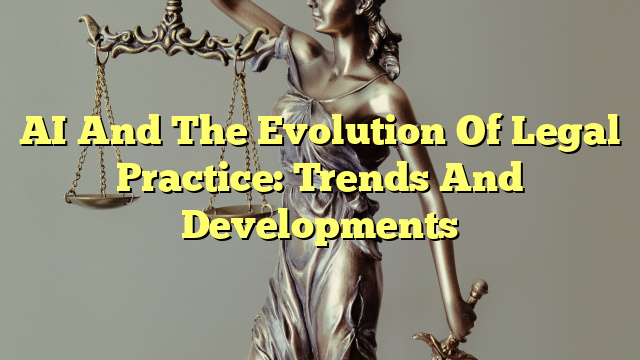Table of Contents
- How Artificial Intelligence Will Change the Practice of Law
- How AI is Used in the Legal Sector
- What are the Benefits of AI in the Legal Industry?
- What are the Main Legal Issues with AI?
- Legal AI Companies
How Artificial Intelligence Will Change the Practice of Law
The practice of law is undergoing rapid and profound changes due to the introduction of artificial intelligence (AI). AI has the potential to revolutionize the legal industry, providing unprecedented levels of efficiency and accuracy. AI is already being used in a variety of ways to automate mundane tasks, increase efficiency, and improve accuracy. AI-driven applications can be used to automate document review, automate discovery and legal research, and provide legal advice. AI is also being used to automate legal processes, such as contract review and negotiation. All of these advances have the potential to dramatically improve the practice of law.
How AI is Used in the Legal Sector
AI is being used in a variety of ways in the legal sector. AI-driven applications can be used to automate document review, automate discovery and legal research, and provide legal advice. AI is also being used to automate legal processes, such as contract review and negotiation. AI is also being used to analyze data in order to assist with legal decision making. AI is also being used to automate mundane tasks such as drafting pleadings and motions.
What are the Benefits of AI in the Legal Industry?
The potential benefits of AI in the legal industry are numerous. AI-driven applications can automate mundane tasks and free up time for lawyers to focus on higher-value work. AI-driven applications can also increase the accuracy of legal work, as AI-driven applications can analyze data in ways that are not possible for humans. AI-driven applications can also improve efficiency, as AI-driven applications can perform tasks quickly and accurately. Finally, AI-driven applications can reduce costs, as they are often more cost-effective than hiring additional personnel.
What are the Main Legal Issues with AI?
The main legal issues with AI are the potential for job displacement, privacy concerns, ethical considerations, and legal uncertainty. Job displacement is a concern because AI-driven applications can automate certain tasks, potentially reducing the need for human labor. Privacy concerns arise because AI-driven applications can access and process vast amounts of personal data. Ethical considerations arise because AI-driven applications can make decisions without the input of humans. Finally, legal uncertainty arises because it is not yet clear how the law will apply to AI-driven applications.
Legal AI Companies
There are a number of companies offering AI-driven applications for the legal industry. These companies include LexisNexis, ROSS Intelligence, Neota Logic, and Kira Systems. These companies offer a variety of AI-driven applications, ranging from document review to automated legal advice. These companies are at the forefront of the legal AI revolution, and the legal industry is likely to see more such companies in the future.
In conclusion, AI is changing the practice of law in a number of ways. AI-driven applications can automate mundane tasks, increase efficiency, and improve accuracy. AI is also being used to analyze data and provide legal advice. However, there are a number of legal issues that arise with the use of AI, including job displacement, privacy concerns, ethical considerations, and legal uncertainty. Nevertheless, there are a number of companies offering AI-driven applications for the legal industry, and the legal industry is likely to see more such companies in the future.


Artificial intelligence is revolutionizing the legal profession by being used to streamline tasks and optimize resources. The evolving trends in AI are changing the way we practice the law and keep up with developments.
AI won’t be the solution to the evolution of legal practice, as human judgement is still required.
The development of AI in the legal profession is an interesting trend that can improve efficiency while creating novel opportunities for practice. My suggestion to add to this would be to explore the potential of AI in helping to create automated legal documents that could significantly reduce time and costs.